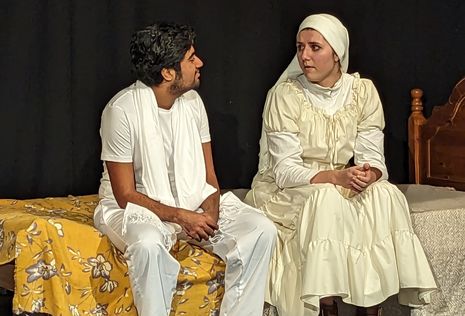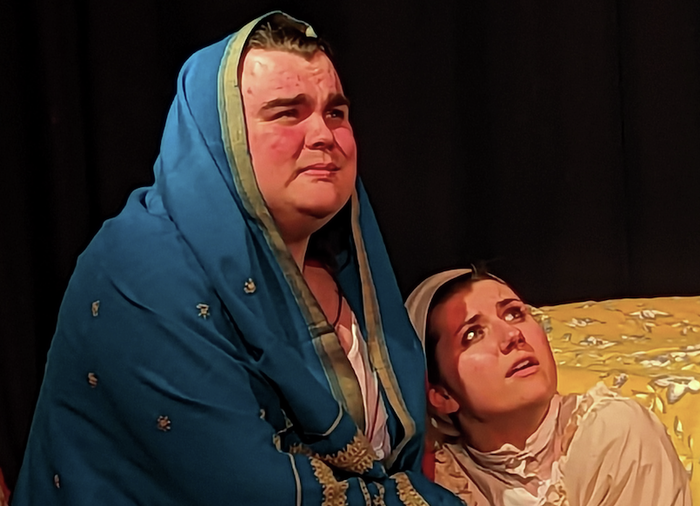Do Gen Z creatives ‘do God’?
Michael Allan searches for faith in student theatre

Last year, I spent most Sundays in church and many of my week nights in the ADC, traversing two worlds that aren’t, perhaps, all too frequently travelled between. When you think of a Cambridge Christian, you probably imagine earnestness, conservatism and a slightly terrifying glint of zealotry in the eye. A thesp, on the other hand, brings to mind extravagant, uber-confident extraverted characters (also, yes, endowed with a touch of ocular fanaticism), performing with gusto on and off the stage. Yet the more plays I attended, the less I felt I had left the thought-world of Sunday’s sermon behind. Lacking the evangelistic certainty of the church service, many of these productions nevertheless seemed to draw upon the same well of religious and existential thinking.
“The more plays I attended, the less I felt I had left the thought-world of Sunday’s sermon behind”
Now, I’m not talking about your grandmother’s religion. I’m talking about a distinctly heterodox, subversive, angsty and unapologetically-queer religiosity that the Cambridge theatre scene seems to embrace. Take two productions by student playwright Jacinta Ngeh, performed in the last year: Greater than Ourselves, the story of a pious Catholic mother and her gay son, and A Profession of Faith, which centred on the struggle of a doctor to reconcile his faith with the detachment of his profession. Works less explicitly focused on faith, like last term’s 5/11(about the Gunpowder Plot) and Tennessee Williams’ Summer and Smoke (grounded in a flirtation between a roguish doctor and a moralistic young woman) still revolved on a religious axis: where is the balance between personal conviction and political action? Who are the rightful judges of our behaviour? What is the correct relationship between sensuality and intellect, between freedom and honour? These are moral and spiritual questions that don’t necessarily begin with God, but are always measured against an absolute ideal of the good life.
This term’s productions, like The Book of Margery Kempe and the upcoming Macbeth at the Round Church continue the trend of searching for a God who seems to have disappeared and yet lingers. Cambridge is not exceptional in showing these signs of a resurrected heterodox religiosity. In August 2022, The New York Times carried an essay headlined ‘New York’s Hottest Club is the Catholic Church’, an exploration of a Dimes-Square-centred scene of podcasters, meme makers, chronic tweeters and aspiring writers. These influencers have channelled the Gen Z neurotic conscience into a thriving subculture that takes traditional symbols of religious iconography as tools to explore angst, guilt and our flawed, fraught attempts at love.
“Cambridge is not exceptional in showing these signs of a resurrected heterodox religiosity”
The symbolic imagination of this world takes Our Lady of Sorrows, a Catholic devotion to the Virgin Mary’s ‘seven sufferings’, as a model of sacrificial love; the ‘side wound of Christ’, a common feature of mediaeval writing and art, is used to represent our personal bleedings, as well as an eroticism of submission and consumption. The Christian martyr, slain as a consequence of their resolute commitment to their lover Jesus, is made into a portrait of the situationship sufferer, martyred in their unreciprocated loyalty. Pivotal inspirations behind this cultural sphere include the poet Richard Siken, whose Litany in Which Certain Things are Crossed Out is often quoted - ‘Love, for you/is larger than the usual love. It’s like a religion. It’s terrifying’ - and the musician Mitski, whose 2012 song ‘Abbey’ - ‘I was born hungry/What do I need? I was born something/What could it be?’ - recently started trending again. Mitski’s bewildered grasping towards an ineffable ‘something’ encapsulates this broader cultural movement. The creative excavation of religion is in no way creedal, or ‘convicted’ about any dogmatic or rationalistic approach to the nature of the universe; it stems from a disconcerted, anxious struggle to locate oneself in a world that lacks clarity or purpose. In this religious ‘searching’ for a place, intellectual or material, to feel reconciled within, the theatre presents itself as a natural spot.
Theatre was, after all, born out of religiosity. The great plays of Aeschylus, Sophocles and Euripides were all performed at the Dionysia, a splendorous public festival given in honour of Dionysus. More recently, Samuel Beckett spent a lifetime exploring the inevitability of death and the oblivion of meaning in the modern world. The conjunction between faith and theatre stems naturally from the many similarities between worship and performance. The worshipper makes themselves a conduit for the Spirit’s revelation, just as the performer empties themselves of their own individual idiosyncrasies so that the character they portray can exist within them. Both worship and performance are driven by physicality; you worship and perform with your whole body, whether by engaging in the sacraments or embodying your character. Theatrical performances and religious ceremonies are artificial simulations of an emotional pilgrimage - from scene to scene, from sin to grace - that are nevertheless experienced as real transformations. Good theatre, like good religion, exists to shock us out of complacent, passive lifestyles into heightened states of being.
“The conjunction between faith and theatre stems naturally from the many similarities between worship and performance”
The form itself, then, is willing; particular Gen Z contributions to the conversation are the themes of hunger, desire and neglect. We are resisting a culture addicted to a ‘cleverness’ that is often indistinguishable from cruelty, a Gen X artistry which prizes irony and cynicism above all while holding simplicity and sincerity with contempt. The ‘ironic approach’ has been memed into the stratosphere. Now, the cult of clever cruelty seems easy and gross; authenticity, vulnerability and the naked honesty of the confessional appear far more attractive.
This contempt for Gen X cynicism also can’t be understood without an awareness of the material circumstances of our lives. Against a picture of dwindling employment prospects, precarity in housing, economic insecurity, an intensification of the climate crisis and a wide disillusionment with the exploitation-ridden promise of sexual liberation, it is no surprise that young creatives are more interested in dismantling structures of wit and suspicion and rebuilding them through an artistry of love and sacrifice.
Finally, there’s the fact that, having grown up alongside the internet, we’re a generation who has never had to be properly bored, and so have known constant stimulation - but only of the sort that ultimately leads to the immobilising stupor of the unending Twitter scroll. We are, as a response, ravenous not for more insubstantial junk food, but for experiences and passions that expose and engross us.
“We are... ravenous”
A lot of the time, I just want to feel something. Something real, honest and intense. It doesn’t really matter if it’s joyful or heart-breaking, as long as it hits me with the force of ten thousand bricks. The young have always been hungry, but they’ve rarely been so deprived of nutrition. We are seeking immediacy. Gen Z creatives aren’t worshipping the transcendent deity of old-time religion, but a god that lives in the pits of our stomachs, in the breath, flesh, tears and sweat of moments of great feeling. The ‘miss it and it’s gone!’ quality of live theatre makes it an ideal stage for the groaning of our generation’s collective hunger.
 News / Uni Scout and Guide Club affirms trans inclusion 12 December 2025
News / Uni Scout and Guide Club affirms trans inclusion 12 December 2025 News / Pembroke to convert listed office building into accom9 December 2025
News / Pembroke to convert listed office building into accom9 December 2025 News / Cambridge Vet School gets lifeline year to stay accredited28 November 2025
News / Cambridge Vet School gets lifeline year to stay accredited28 November 2025 Features / Searching for community in queer Cambridge10 December 2025
Features / Searching for community in queer Cambridge10 December 2025 News / Uni redundancy consultation ‘falls short of legal duties’, unions say6 December 2025
News / Uni redundancy consultation ‘falls short of legal duties’, unions say6 December 2025









